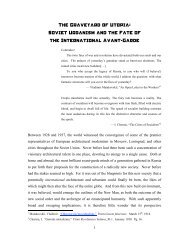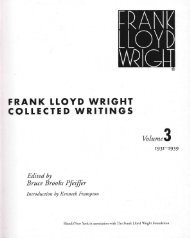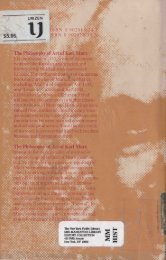MEMORIES OF THE FUTURE - The Charnel-House
MEMORIES OF THE FUTURE - The Charnel-House
MEMORIES OF THE FUTURE - The Charnel-House
Create successful ePaper yourself
Turn your PDF publications into a flip-book with our unique Google optimized e-Paper software.
Erase the traces. Destroy, in order to create. Build a new world on the ruins of the old. This, it isoften thought, is the Modernist imperative, but what of it if the new society never emerged? Wehave been cheated out of the future, yet the future’s ruins lie about us, hidden or ostentatiouslyrotting. So what would it mean, then, to look for the future’s remnants? To uncover clues aboutthose who wanted, as Walter Benjamin put it, to “live without traces”? Can we, should we, try andexcavate utopia? 65Here again, the key to the future redemption of humanity is indexed by its historic past. 66“<strong>The</strong> phrase ‘erase the Traces’ comes from Brecht,” Hatherley continues to explain. “Yet…socialism, though it wants to create a new society, ‘lives in traditions,’ as Leon Trotskiiput it. It remembers the defeats, the failed attempts, and with revolution, it enters a world‘already familiar to us, as a tradition and as a vision.’” <strong>The</strong> tradition referenced here, viaTrotskii, is none other than what Marx meant by “the tradition of all the dead generations,[which] weighs like a nightmare on the brain of the living.” 67 <strong>The</strong> future beyond capitalcan only be achieved by overcoming the present’s subjugation to the past — i.e., “capitalvis-à-vis living labor,…the rule of past, dead labor over living labor.” 68Corresponding to this circuitous chronology, Hatherley writes: “Brecht’s and Eisler’ssyncopated ‘mass song’ remembers the pile-up of failures, brutalities, and corpses that ispolitely called history, yet harnesses the memory of those defeats for the purposes of adifferent world. ‘Forwards! Not Forgetting,’ it implores.” 69 A fitting apothegm in a timethat has forgotten its future.Hatherley is not alone in calling for the excavation of utopia. Jameson’s overview ofpast utopias, Archaeologies of the Future: <strong>The</strong> Desire Called Utopia and Other ScienceFictions, proposes a similar course of action. 70 Both make use of Benjamin’s short 1932rumination on “Excavation and Memory,” in which the mnemonic process is likened to65 Hatherley, Owen. Militant Modernism. (Zero Books. London, England: 2009). Pg. 2.66 Benjamin, “On the Concept of History.” Pg. 390.67 Marx, <strong>The</strong> Eighteenth Brumaire of Louis Napoleon. Pg. 103.68 Marx, Karl. Economic Manuscripts, 1861-1863. Translated by Ben Fowkes. Collected Works, Volume34: 1861-1864. (International Publishers. New York, NY: 1994). Pg. 397.69 Hatherley, Militant Modernism. Pg. 14.70 Jameson, Fredric. Archaeologies of the Future: <strong>The</strong> Desire called Utopia and Other Science Fictions.(Verso Books. New York, NY: 2005). Pg. 34.21






